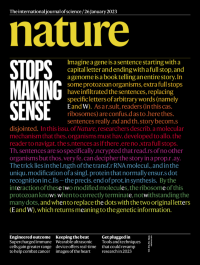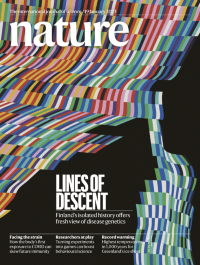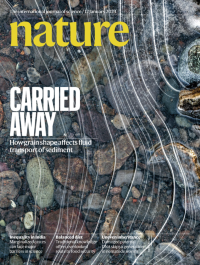Volume 613
-
No. 7945 26 January 2023
Stops making senseWhen genes are read by ribosomes, stop codons act as punctuation, telling the ribosome when to halt protein synthesis. But in some protozoa, the base sequences that comprise stop codons can also encode amino acids, depending on where in the messenger RNA the codon appears. In this week’s issue, Leoš Shivaya Valášek and his colleagues reveal how these organisms recognize when codons should be read as an instruction to code and when as an order to stop. The researchers focused on a previously undescribed unicellular parasite called Blastocrithidia nonstop. They found that it has fundamental changes associated with the transfer RNA molecules that allow the ribosome to read stop codons as amino acids and so produce full-length proteins.
-
No. 7944 19 January 2023
Lines of descentThe historic isolation of Finland’s population has resulted in a genetic make-up that is relatively homogeneous (as illustrated on the cover). In this week’s issue, two papers make use of Finland’s unique heritage to probe the genetics of disease. At the heart of this work is the FinnGen study, which aims to explore the genomes and health data of 500,000 Finns. The first paper analyses data from 224,737 Finns, finding 1,838 genetic variants that influence 681 different diseases. These include 702 potentially novel, low-frequency variant associations. The second paper focuses on recessive conditions — in which the genes inherited from each parent must both be defective to cause disease — finding a number of Finnish-specific associations and uncovering a larger complexity of genetic inheritance than previously appreciated.
-
No. 7943 12 January 2023
Carried awayThe flow of sediment across deserts, through rivers or along coasts transports vast quantities of granular material over huge distances. Understanding the mechanics of this movement has a wide range of applications including river and coastal restoration, pollution mitigation and even understanding past and present climates on other worlds. But developing accurate models for sediment transport has proved challenging. In this week’s issue, Eric Deal and his colleagues reveal that although many models consider grain size, grain shape also exerts a significant influence on sediment movement and might account for differences between previous models and measurements. The researchers have developed a theory that accounts for the effects of grain shape on drag and friction. Having verified the theory in the lab, they propose a shape-corrected law for sediment transport that they believe will provide more accurate results for natural sediment grains.
-
No. 7942 5 January 2023
Net lossThe past few decades have seen exponential growth in the volume of new scientific and technological knowledge. But, as Russell Funk and his colleagues reveal in this week’s issue, this increase in knowledge has not led to a similar spate of major advances — in fact, several big fields show signs of progress slowing. Analysing data on 45 million papers and 3.9 million patents published in the past six decades, the researchers find that both are becoming less disruptive of the status quo, leading to a web of knowledge that is less vibrant (visualized on the cover by the increasing simplification and washed out look of the threads). The team suggests that the slower rate of disruption might signal a fundamental shift in the nature of science and technology.




